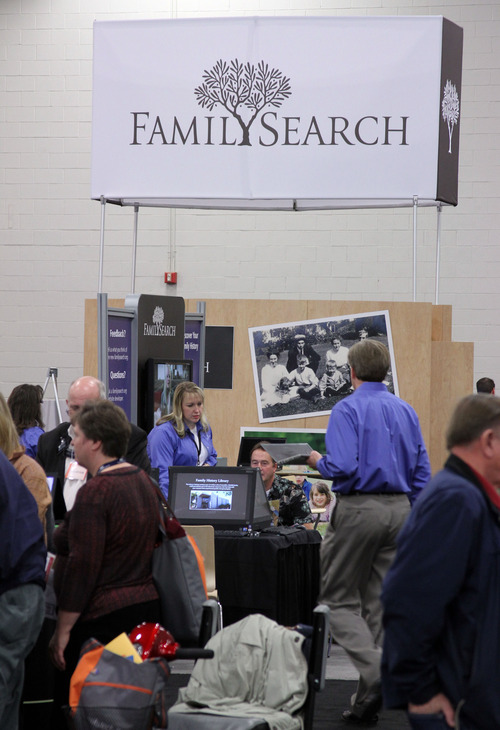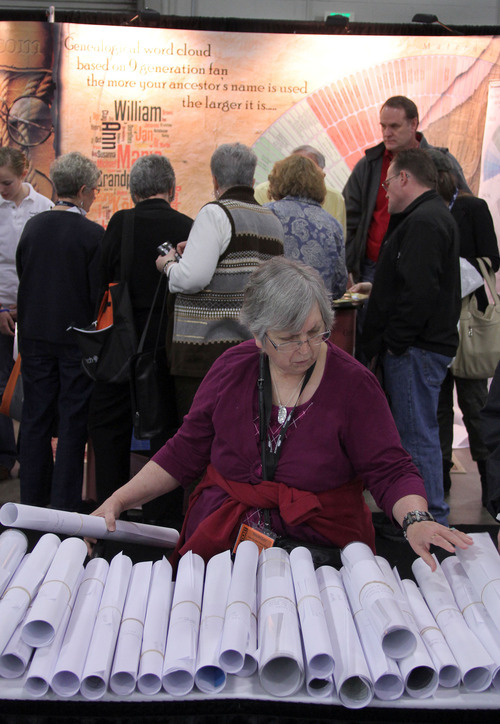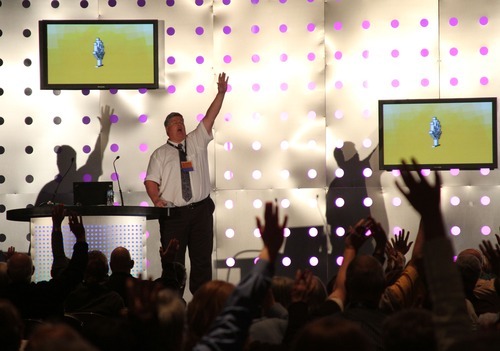This is an archived article that was published on sltrib.com in 2012, and information in the article may be outdated. It is provided only for personal research purposes and may not be reprinted.
The LDS Church-sponsored organization FamilySearch.org has released online indexes for U.S. census records from 1790 to 1840, adding to its free collection of all federal census records to 1930.
FamilySearch also will place online indexes for the 1940 census soon after the National Archives and Records Administration releases the records on April 2. The indexes will be completed by thousands of volunteers, officials with The Church of Jesus Christ of Latter-day Saints announced Saturday during the Technology & Genealogy Innovation conference in Salt Lake City.
More than 4,500 people attended the conference at the Salt Palace, which will be rebroadcast starting Monday on the LDS Church's affiliated website, RootsTech.org.
"The 1940 census is generating a lot of interest," said Paul Nauta, public relations manager for RootsTech. "Not only was this the Greatest Generation that went through the Great Depression and a world war, but many people personally know those listed in the records."
The United States has taken a census of its population every 10 years since 1790, listing information such as names of household members, ages, birthplaces, marriage information and military service. Privacy restrictions do not allow the records to be released for 72 years.
The 1940 census introduced new questions, such as whether a person worked for the Civilian Conservation Corps, a public work relief program; Works Progress Administration, which employed workers to build public buildings and roads or to participate in arts, drama, media and literacy projects; and the National Youth Administration, which provided work and education for Americans between the ages of 16 and 24.
Other census questions asked where people lived five years before, the highest educational grade achieved and detailed income and occupation information.
The release of the 1940 census is a joint initiative between FamilySearch, Archives.com, findmypast.com and other leading genealogy organizations in an effort to provide quick access to the digital images. As soon as indexes for one state are completed, they will immediately be placed online, Nauta said.
More than 130,000 volunteers have helped with FamilySearch projects, indexing records all over the world, but even more volunteers are needed.
To facilitate that goal, FamilySearch has launched its mobile application for indexing. The mobile app works on Apple iPads, iPhones, and Droid smartphones. To download the free app, search for the FamilySearch Indexing app in the Apple app store or Droid Market store online, said James Ericson, FamilySearch market manager for moble apps.
FamilySearch also announced a book-scanning service to make digital copies of printed family history or other books of genealogical value, and place them online.
Volunteers may donate personal works, books that are copyright protected and books that are in the public domain. Donors in turn, keep the original and receive a digital copy. Copyrighted books also may be donated by the copyright holder or an authorized representative.
"Records are far more accessible today, especially for people doing genealogy from the other side of the world," said conferencegoer Martyn Killion of Sydney. "It's amazing to see the technology advancements and the number of volunteers who are willing to donate their time and expertise in putting together indexes. There's a sense of commitment with genealogy that is worldwide."
Joe Garonizik, a genealogy book publisher from Baltimore, said that doing genealogy is getting "easier every year. Records and connections are available that someone might not have dreamed of a few years ago."
Eileen Lentz of Salt Lake City said more people are doing genealogy, but "there's still the sentiment that someone else in the family has already done it. But there are still many pieces missing. It's interesting and important that you fill in that piece."
Among the exhibitors at the conference was Flip Pal Mobile Scanners, which sells a lightweight battery-powered scanner intended to make research easier. It stores scans on a memory card, similar to a digital camera, and can scan photos, newspapers, books and historic documents. The scanner sells for $149 or $199.99 for the deluxe edition.
dawn@sltrib.com Twitter: @DawnHouseTrib What's new in genealogy:
U.S. Census • 1790 to 1840 now indexed on free website FamilySearch.org
1940 census • To be released April 2, indexes will be placed on FamilySearch.org
Phone apps • Volunteers may index censuses, records via smart phones or iPads.
Family, history books • Books in public domain may be placed online at books.FamilySearch.org
Technology & Genealogy Conference • To be rebroadcast at RootsTech.org.
For more information • Visit FamilySearch.org or RootsTech.org







